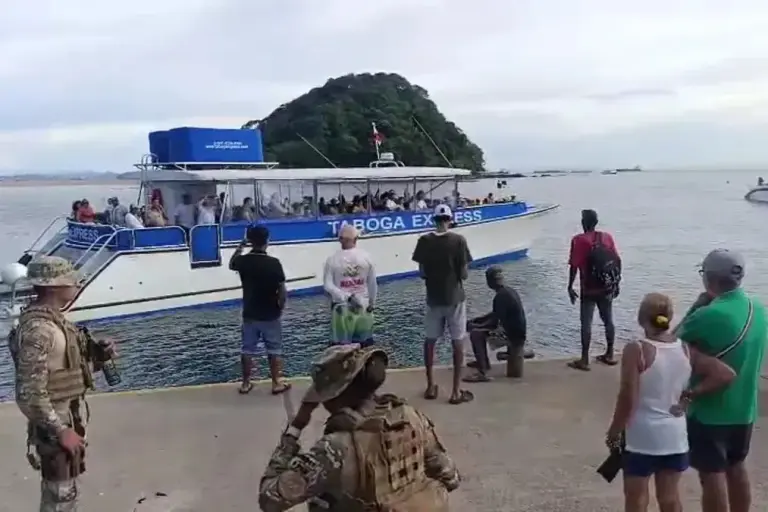Residents of Taboga Island blocked tourist disembarkation at their port on Saturday, November 1, 2025. The demonstration protested a new ferry fare increase that islanders say cripples their finances. Protesters gathered at the main dock to prevent tourists from landing, demanding the Taboga Express Fast Ferry company reverse price hikes that took effect that same day.
Local community members argued the increased ticket prices disproportionately affect them. They rely on the ferry service for all travel to and from the mainland for work, school, and supplies. With limited job opportunities on the island itself, residents frequently use the ferry, making any fare change a significant burden on household budgets.
“We spend on tickets much more repeatedly than tourists. It does not seem fair to us that they raise the cost when we are the ones who use the ferry constantly,” [Translated from Spanish] expressed one resident during the protest.
The direct action effectively halted tourist traffic for a period. This forced a swift corporate response. Facing sustained community pressure, Taboga Express Fast Ferry issued an official communique announcing a temporary agreement.
Company Announces Temporary Fare Freeze
In its statement, the ferry operator conceded to maintaining current pricing until a meeting with local authorities occurs. That meeting is scheduled for Thursday, November 6, 2025. The company detailed that prices would remain at twenty dollars for an adult round-trip. Children and retired residents would continue paying fourteen dollars for their round-trip tickets.
“The existing price is guaranteed to be maintained for permanent residents of the Island until the date of the meeting,” [Translated from Spanish] the official communication specified.
This agreement provides immediate, though temporary, relief for the island’s population. Residents now await the outcome of the scheduled negotiations. They hope for a permanent solution that balances the company’s operational needs with the community’s economic reality.
Island Life Dependent on Ferry Service
The protest underscores the critical nature of affordable maritime transport for island communities. Isla Taboga, often called the “Island of Flowers,” lacks a local economy robust enough to support all its inhabitants. Many residents commute daily to Panama City for employment. Any increase in transportation costs directly reduces their disposable income and complicates their daily logistics.
Tourism represents a vital economic stream for the island. The temporary blockade, while highlighting resident grievances, also risked disrupting the visitor-dependent businesses locals operate. Finding a sustainable pricing model that supports both the ferry company’s viability and the islanders’ mobility is the central challenge for the upcoming talks. The situation reflects broader tensions in communities where essential express fast transport services are operated by private entities.
Island communities remain vulnerable to pricing decisions made by private transport operators. The resolution of this dispute on Taboga will likely be watched closely by other Panamanian island populations. They face similar logistical and economic constraints. For now, a tense calm has returned to the dock, with residents and the company both looking toward Thursday’s critical meeting.



